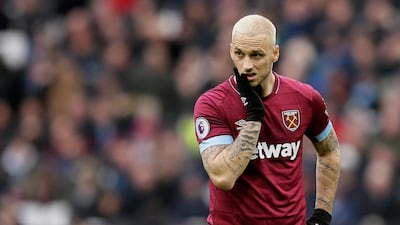The statement was terse and brief, two sentences in total. There were no thanks for the departing player’s efforts, no good wishes for his future, no mention that he was voted Hammer of the Year in his debut campaign at the club.
West Ham merely confirmed that Marko Arnautovic had joined Shanghai SIPG for an undisclosed fee, reported to be £22.4 million (Dh102.9m).
None of which encapsulated Arnautovic’s two years there.
The reality that he got more red cards than goals under the manager who signed him, Slaven Bilic, was reinvented as an imperious, prolific striker by his successor, David Moyes, to the extent that he won the club’s individual awards that season, his failed attempt to join Shanghai in January and the swift volte-face when he then signed a new deal with West Ham.
Understandably, there was no reference to the repeated comments from Danijel Arnautovic, Marko’s brother and agent, that they had signed him for “peanuts”; they sold him for a similar sum and will have to pay twice as much for Maxi Gomez, the Celta Vigo striker who is his putative replacement.
The Austria international may have cashed in from his move, but his former employers have not.
West Ham’s factually accurate confirmation of his sale carried the sting of rejection. The player they thought embodied the club was allowed to exit because he felt a disruptive influence.
The only way to extricate themselves from an increasingly toxic relationship was to make a clean break, at a cost to themselves.
It had the feel of an unwanted action reply. In January 2017, another who had been named Hammer of the Year in his first season for the club was also sold. At least when Dimitri Payet rejoined Marseille, the motivating factor appeared to be loyalty, rather than money, but the outcome was the same.
Another flair player with enviable levels of ability, a footballer with the gifts to play for an elite club, deserted West Ham when it seemed he could have been a defining figure for years.
Arnautovic and Payet appeared iconoclasts in the West Ham tradition; men with chequered pasts who were not a guarantee of consistency but who were artists and match-winners.
They felt Paolo di Canio’s spiritual successors, but at least the idiosyncratic Italian stayed for four-and-a-half years.
Arnautovic and Payet’s briefer stints highlight an issue for the mid-table outfits trying to retain or carve out an identity in the era of the super-club; anything too eye-catching will attract the attention of the vultures.
It is particularly pertinent in West Ham’s case. They have an image that can form part of their appeal, but which one former manager felt was a self-defeating exercise in delusion.
Sam Allardyce used to scoff at the concept of “the West Ham Way.” “Nobody could define it,” he wrote in his autobiography.
Perhaps it was briefly apparent in Arnautovic and Payet. They had the swagger to accompany the skill, the sense they were special players a reminder that West Ham, whatever their on-field fortunes, had often offered the promise of entertainment and the capacity to beat the best.
If neither is Mark Noble, the long-serving local, let alone Trevor Brooking, the unassuming East Londoner who showed his class in the second tier for three years after relegation, even West Ham’s own have been known to cast covetous glances.
Bobby Moore was stripped of the captaincy in 1966 when he wanted to join Tottenham Hotspur.
If the modern game has been changed by finances and the probability only a select few clubs can collect silverware, perhaps the West Ham Way always entailed seeing stellar talents eye the exit.


